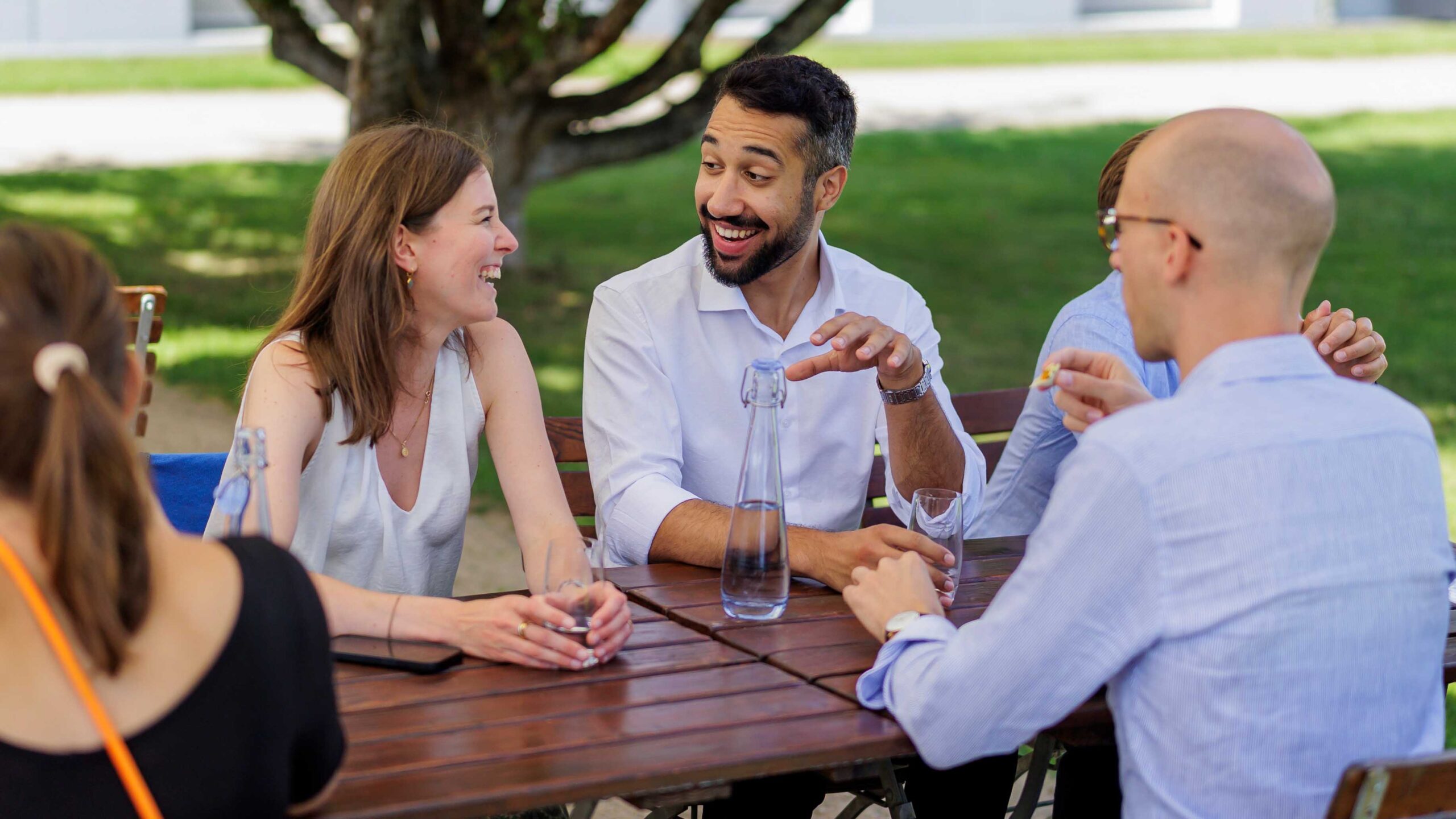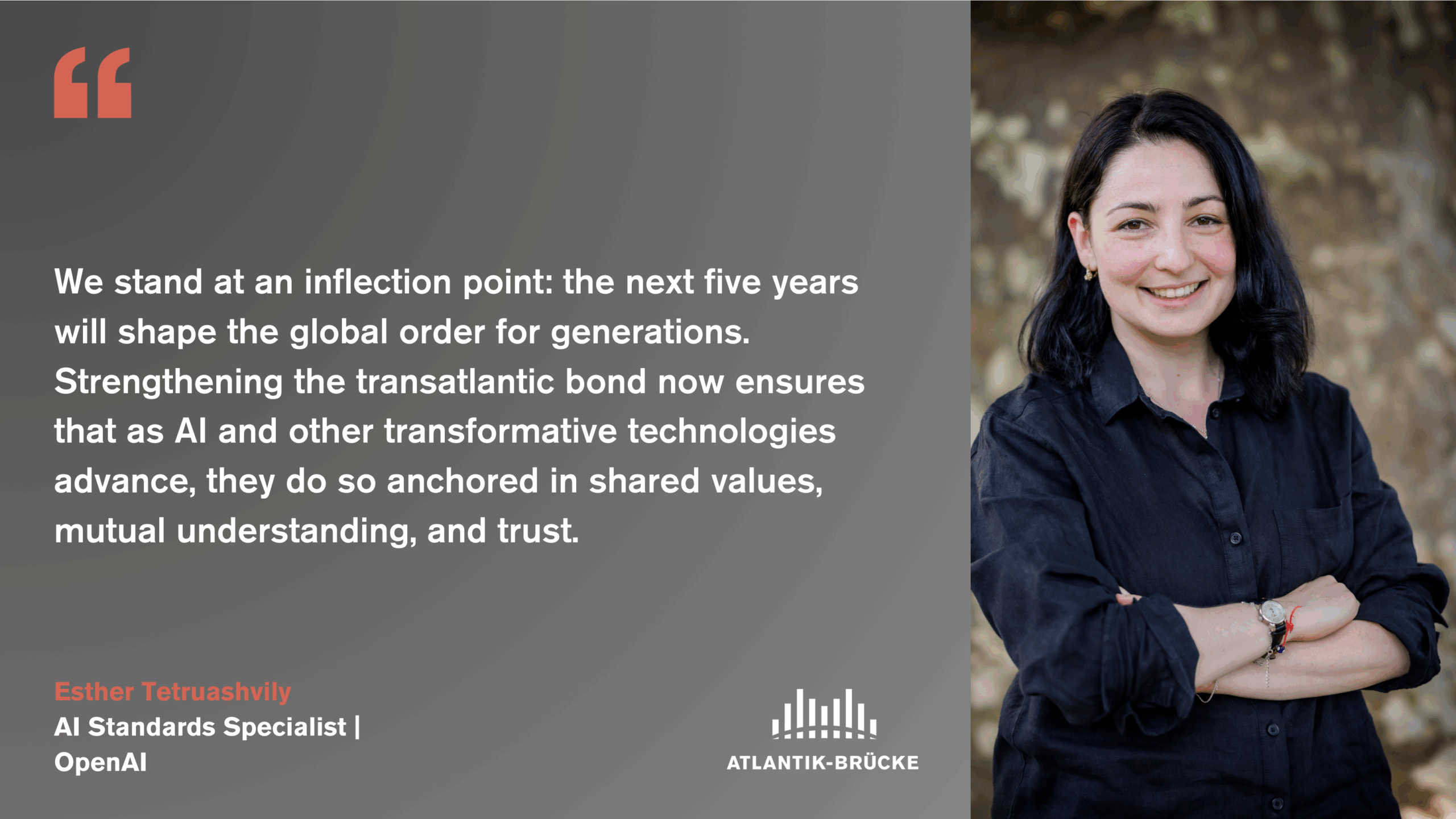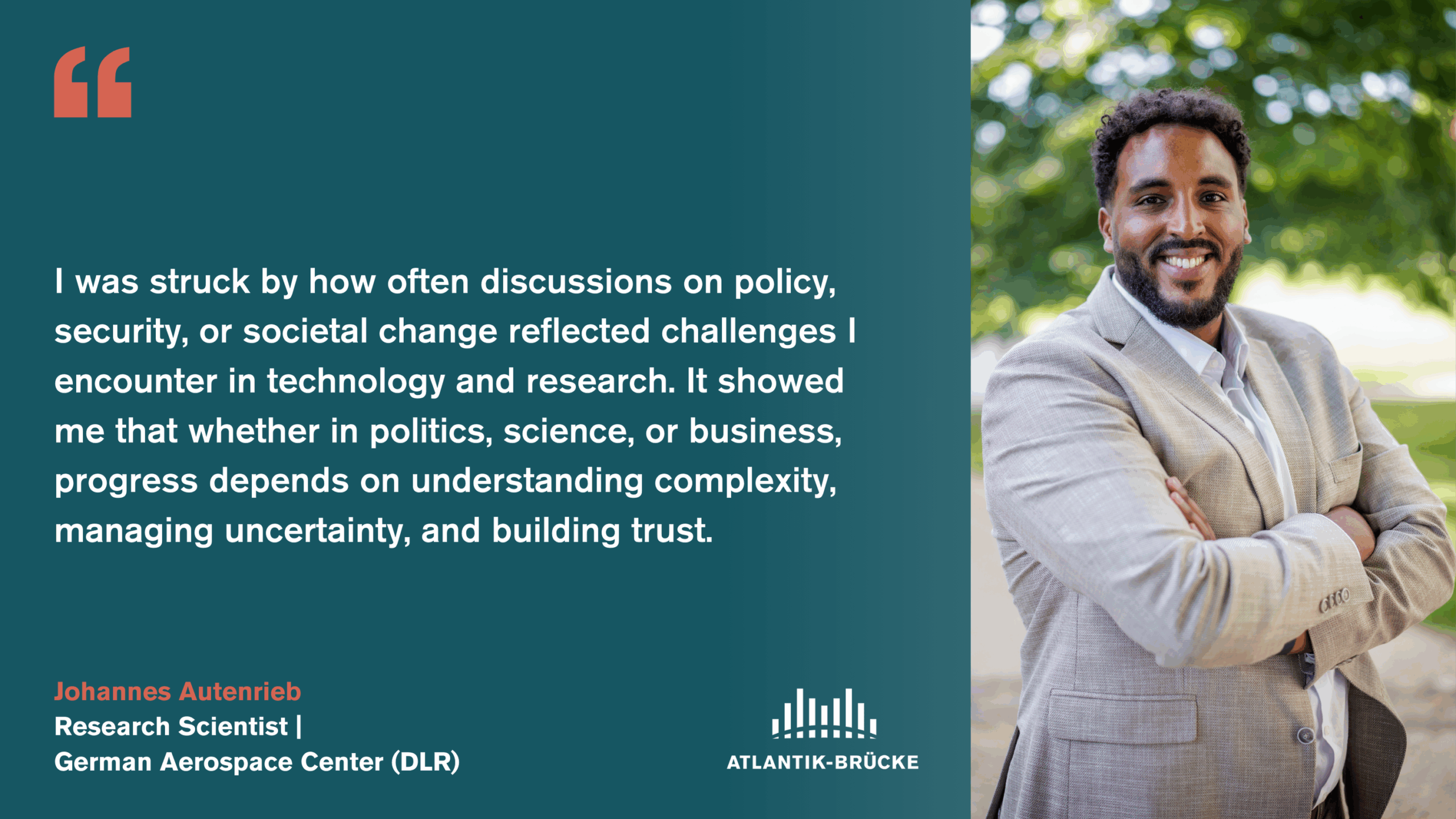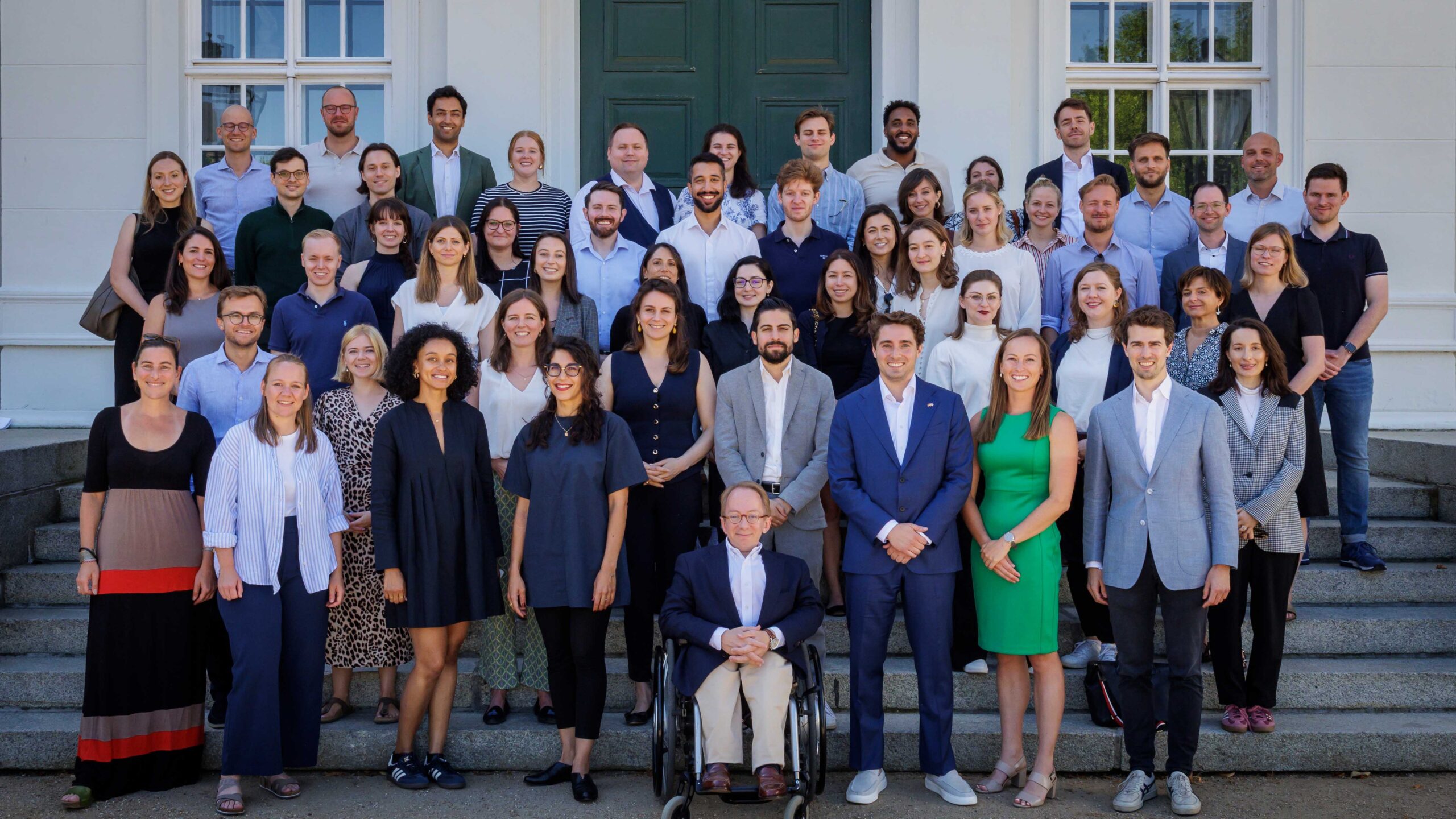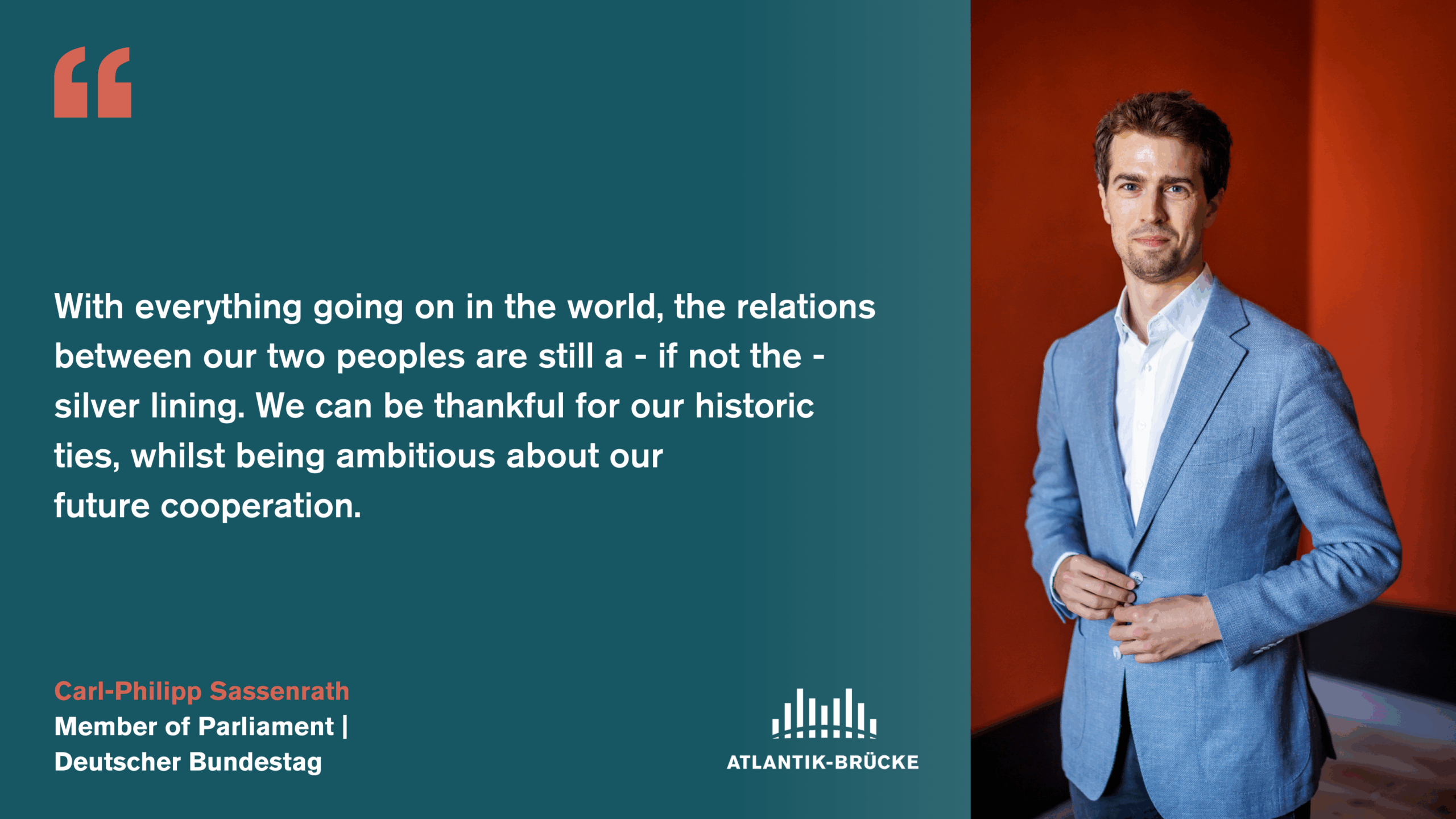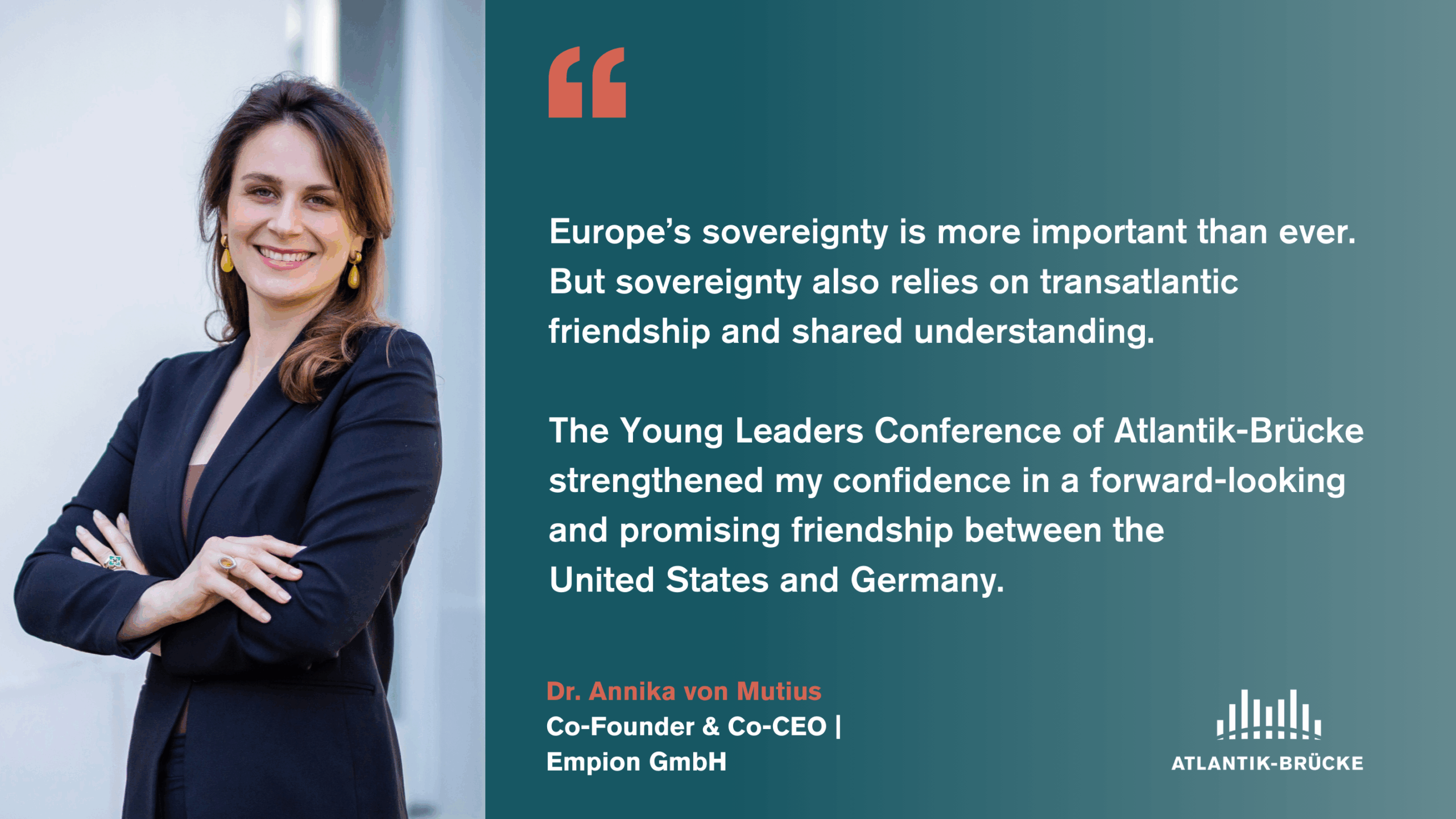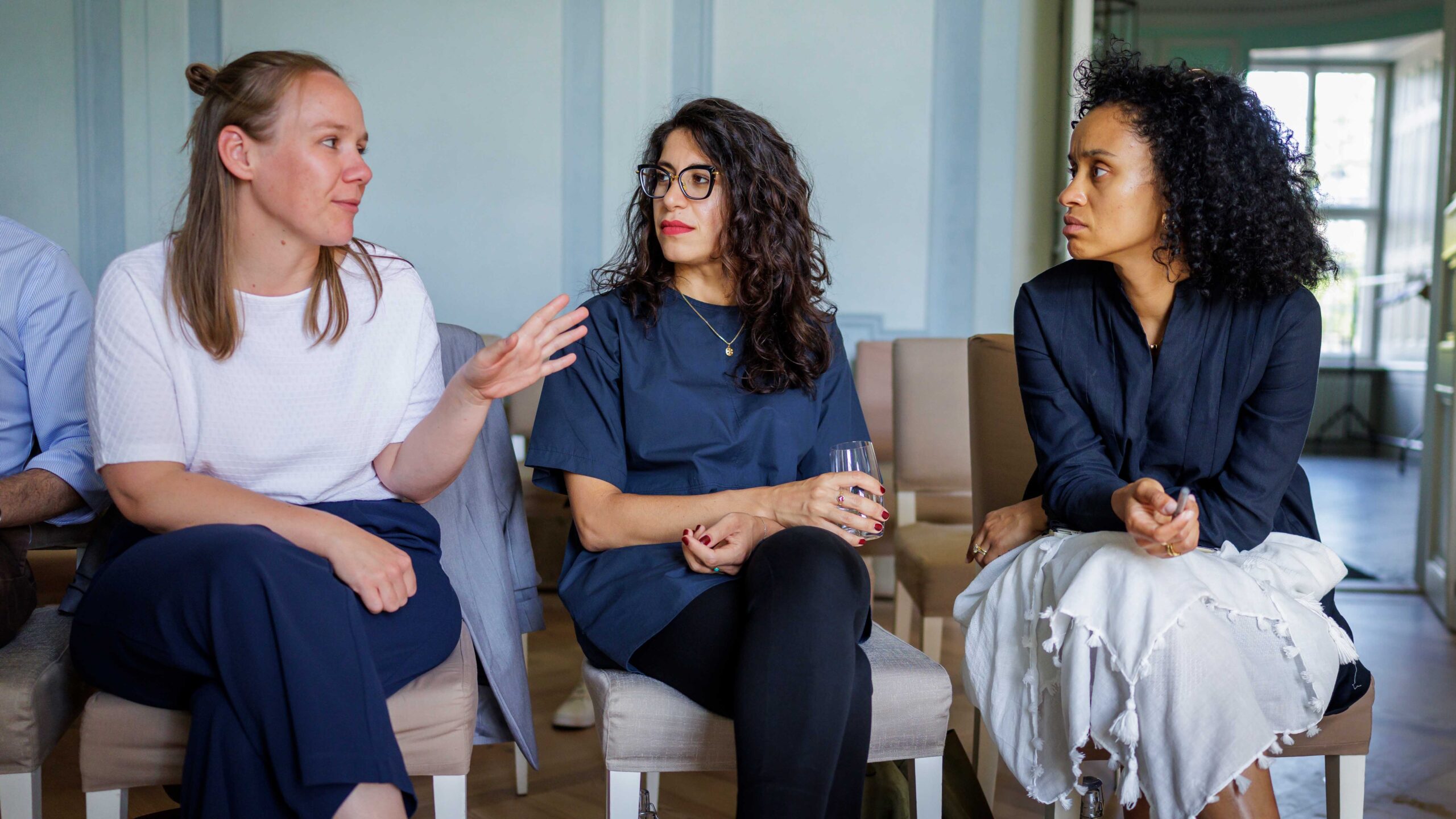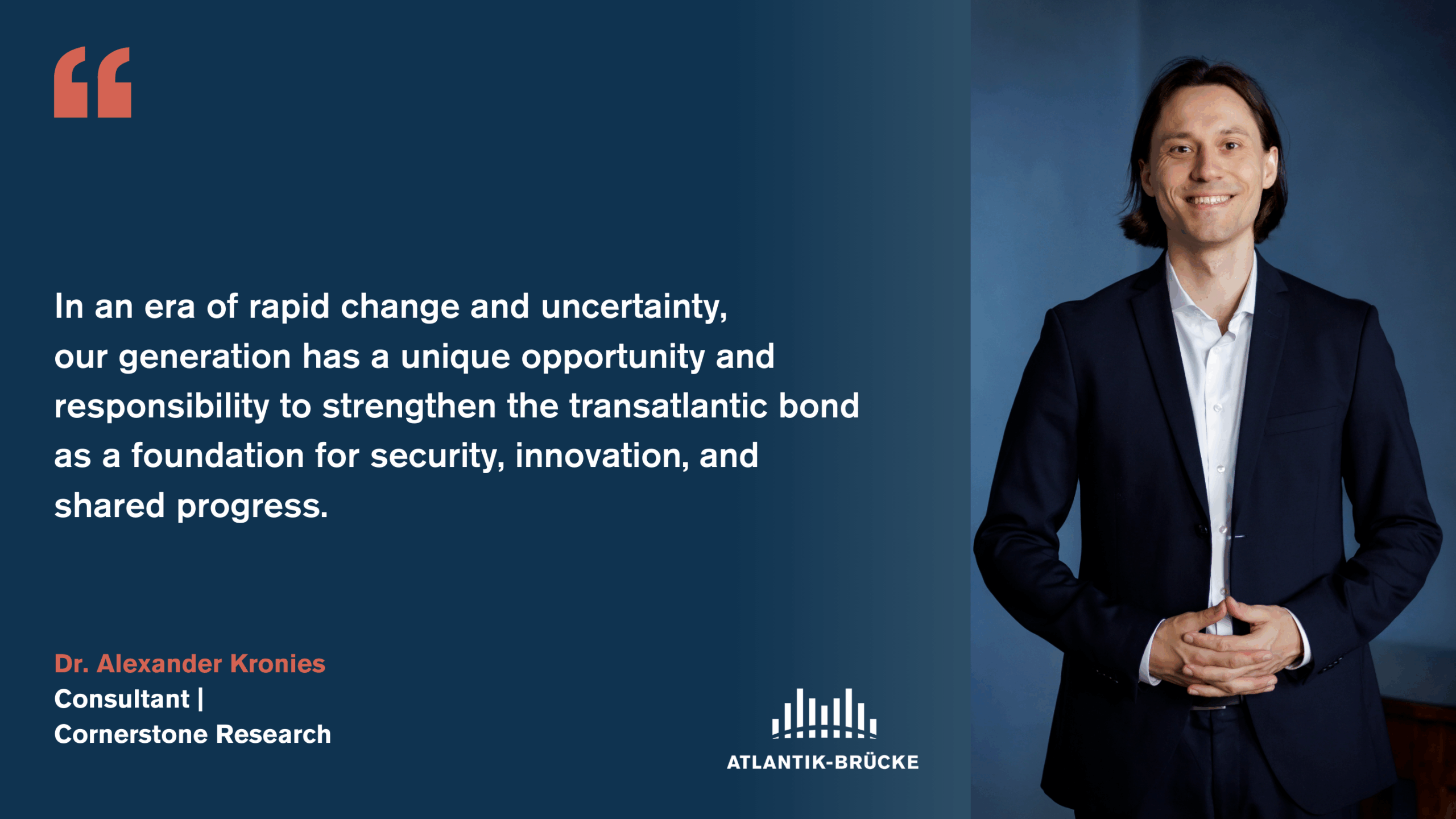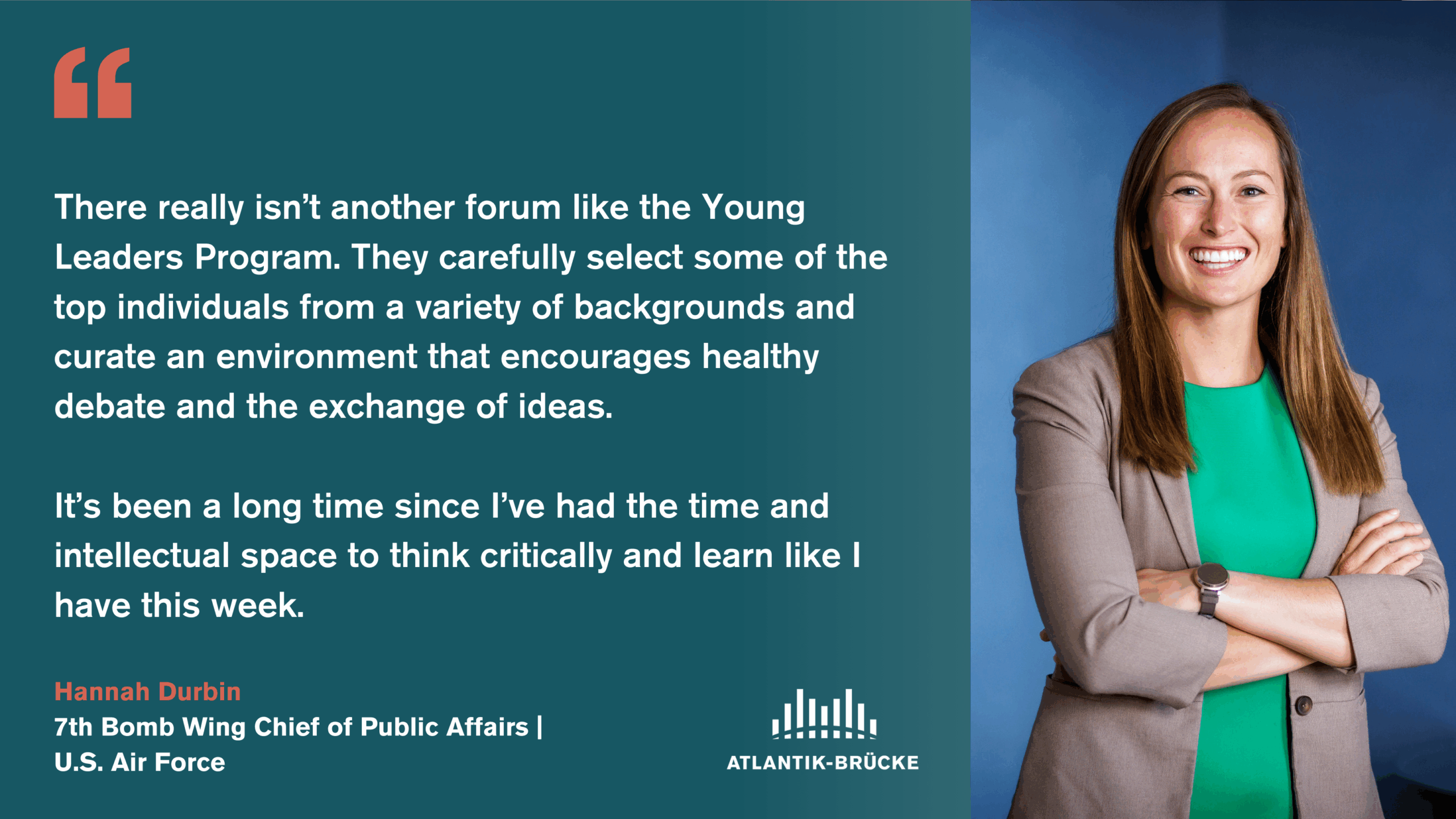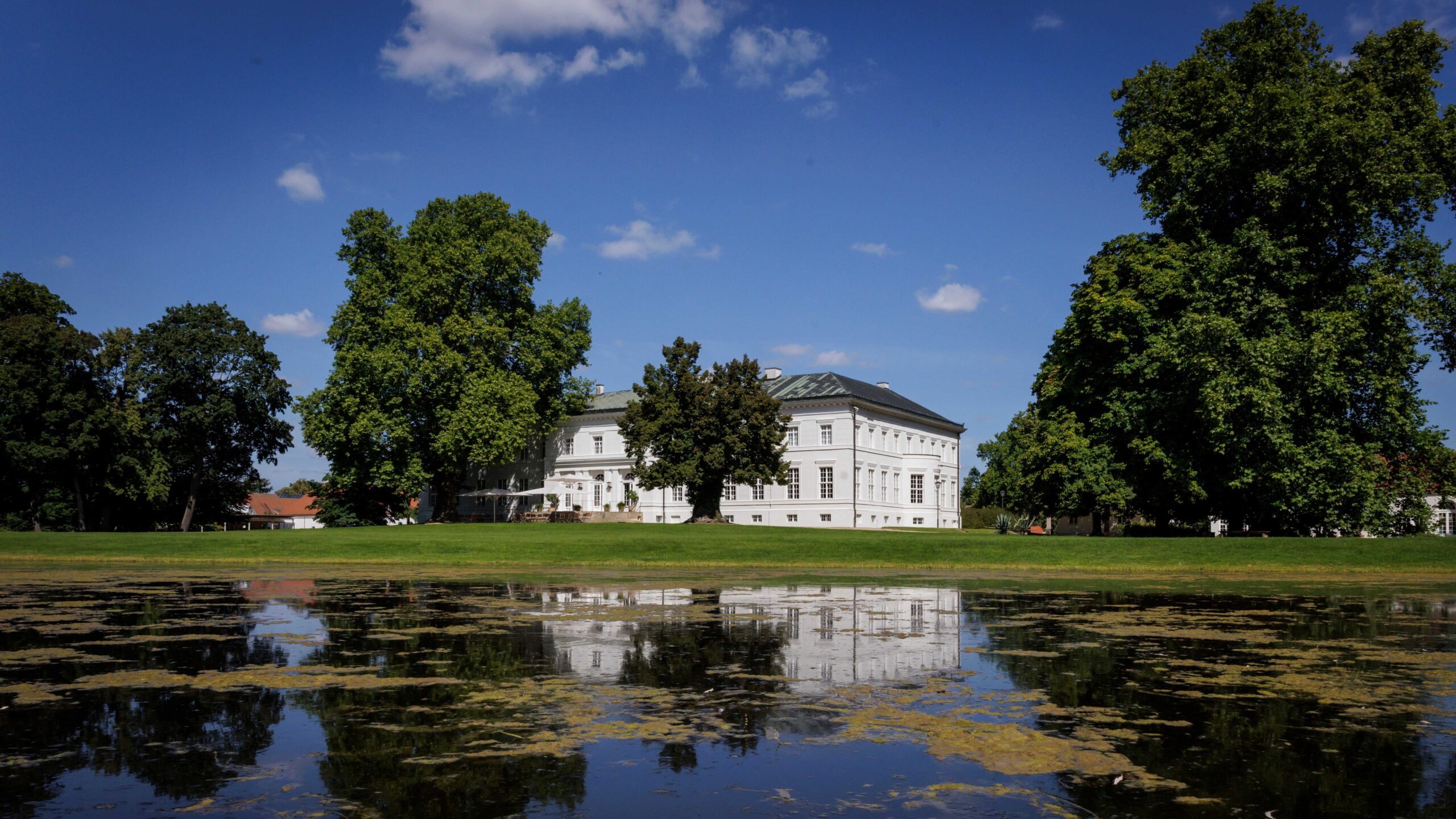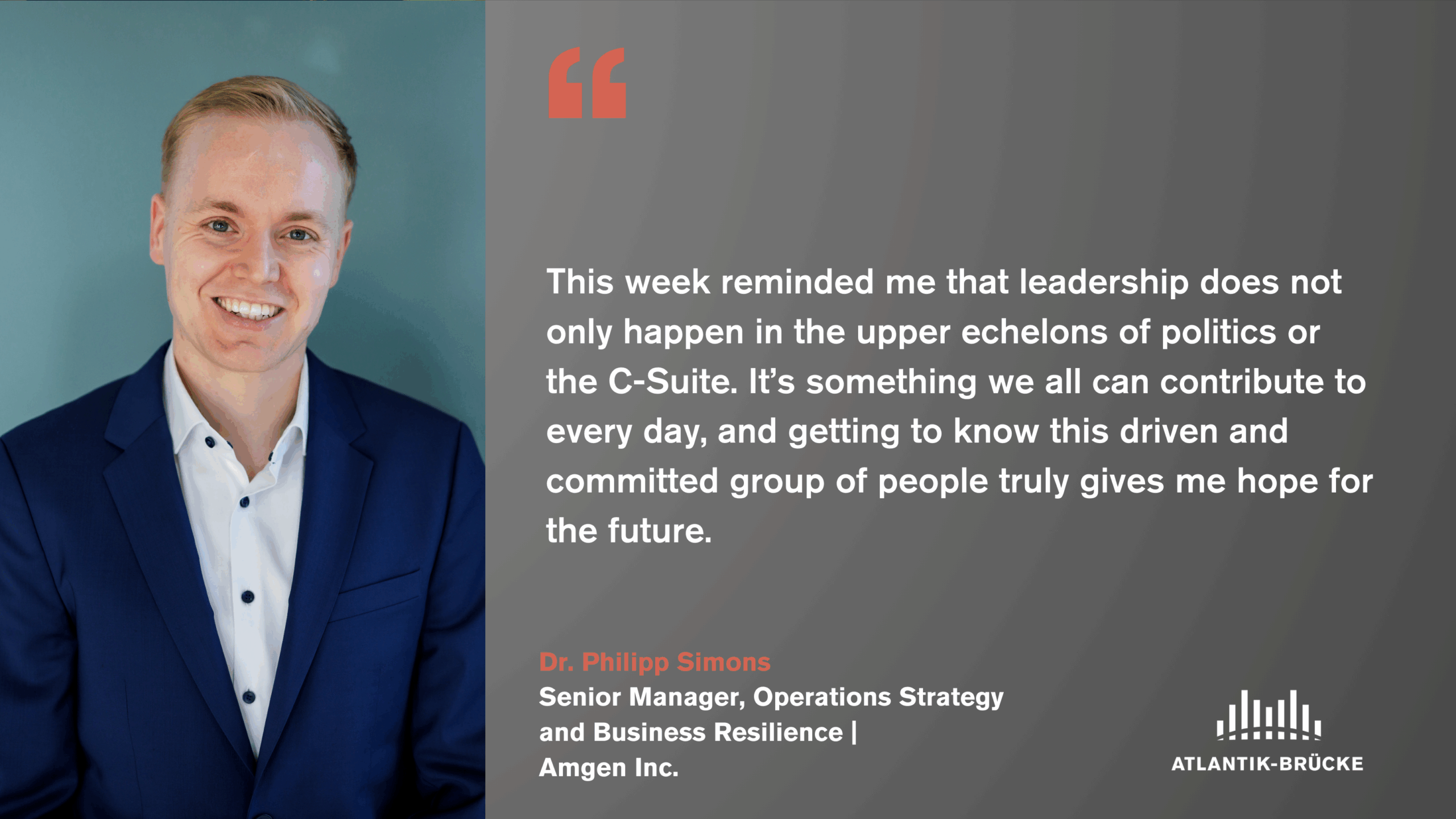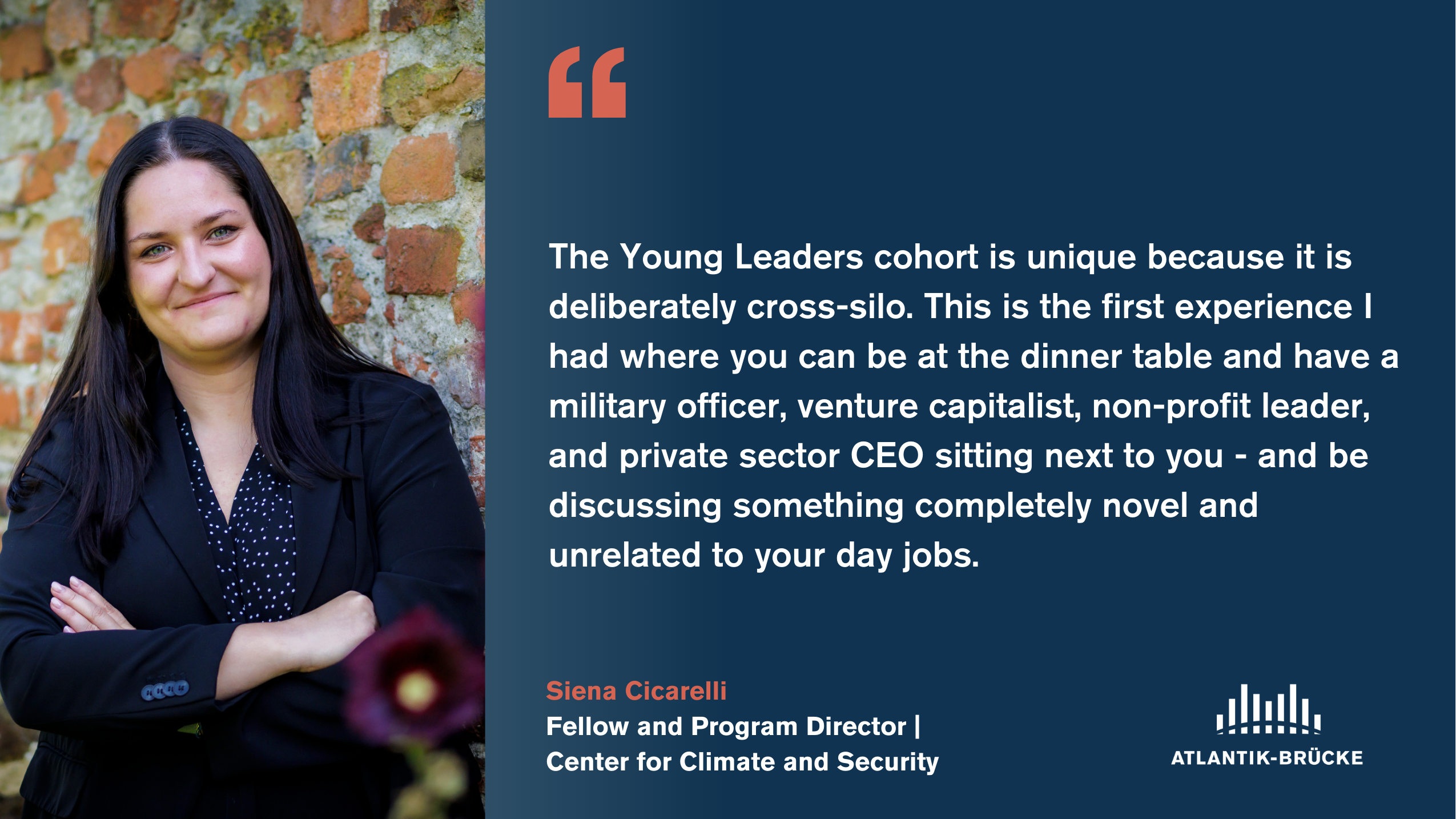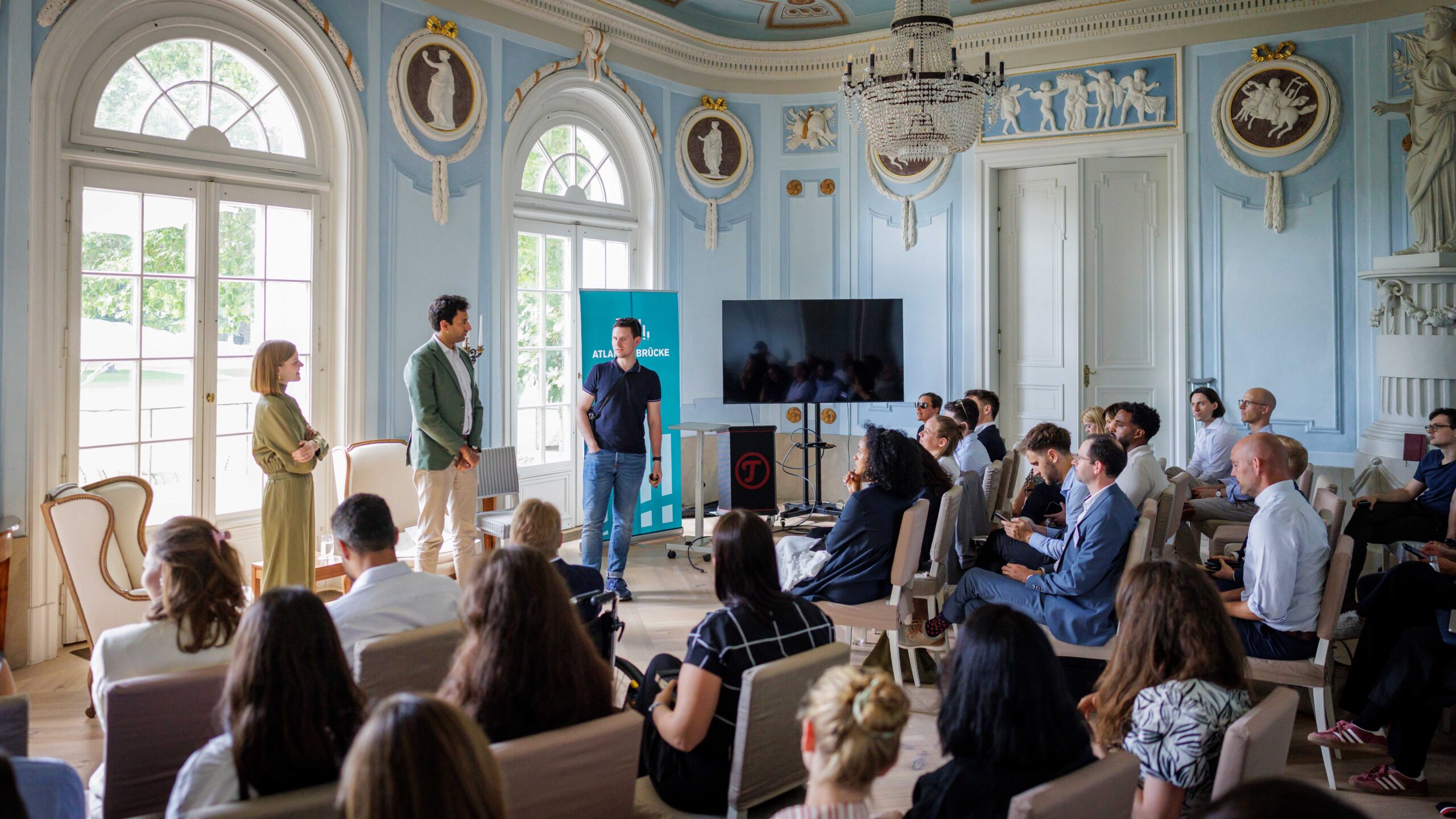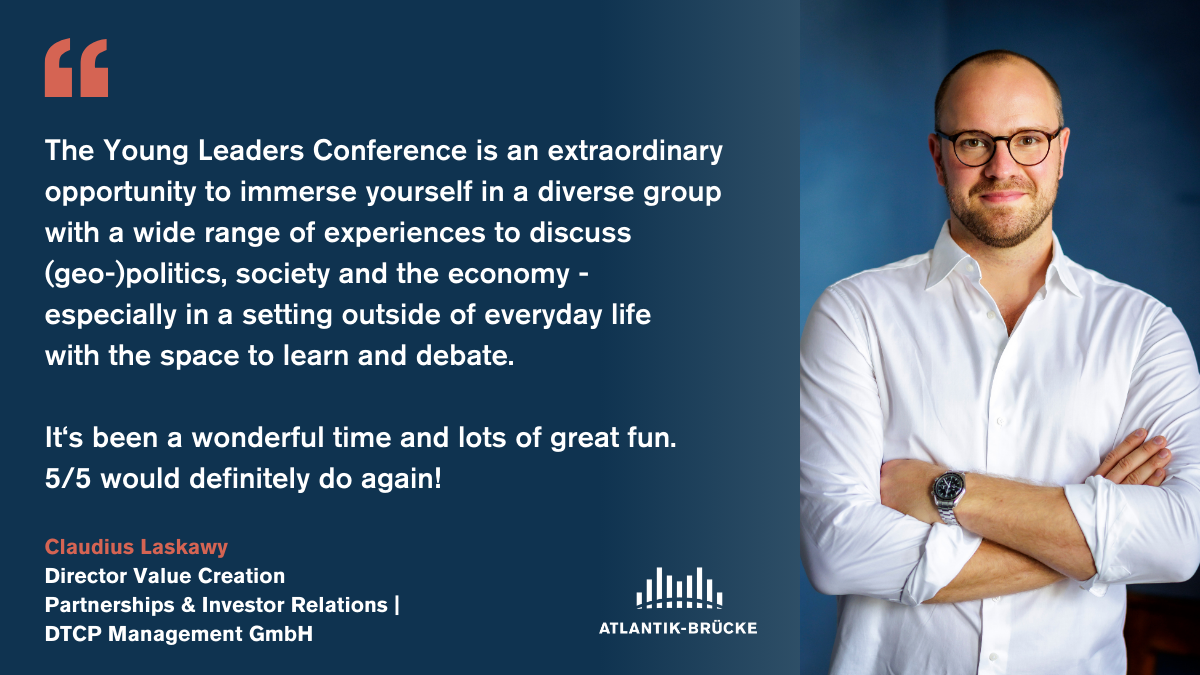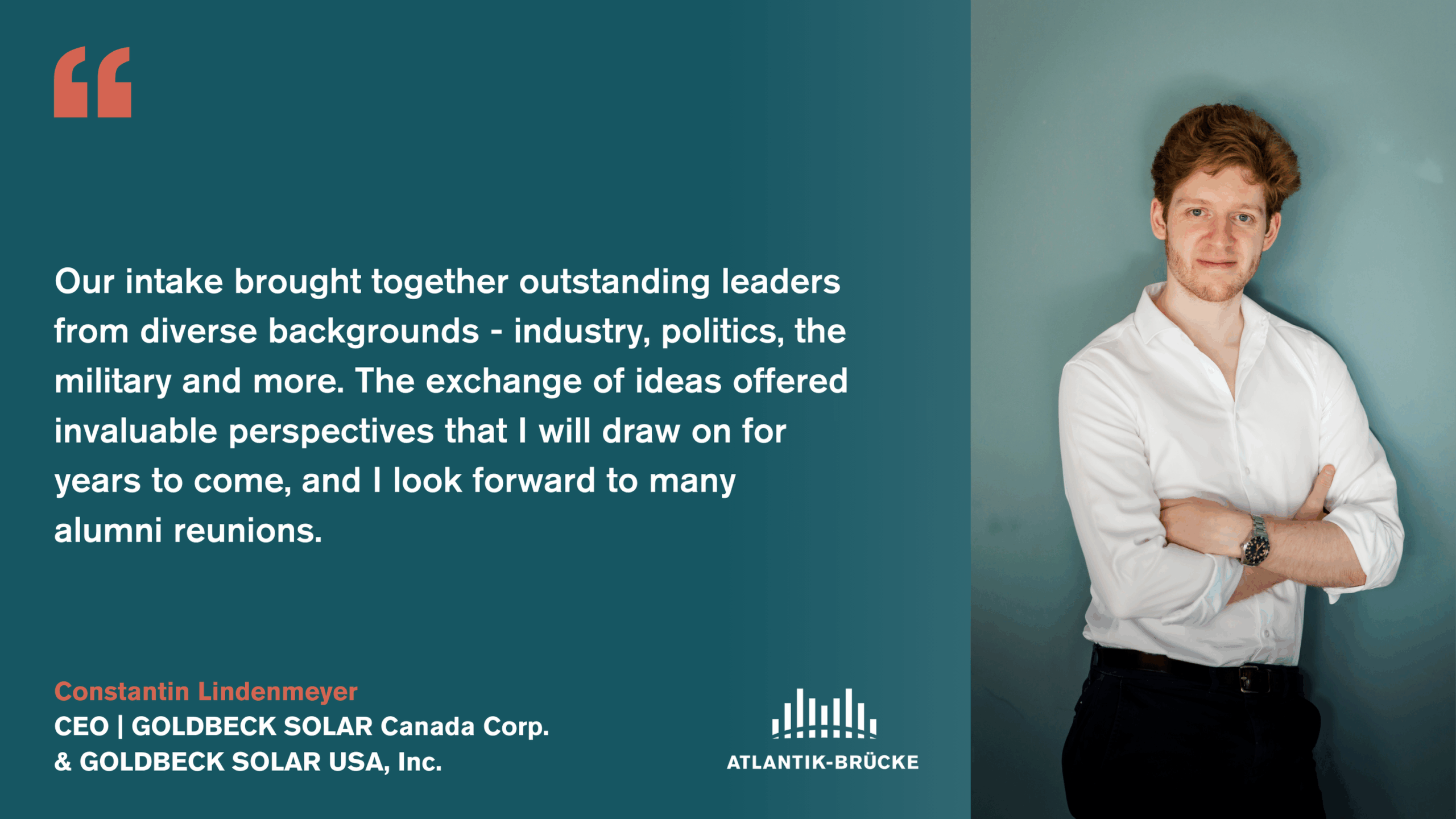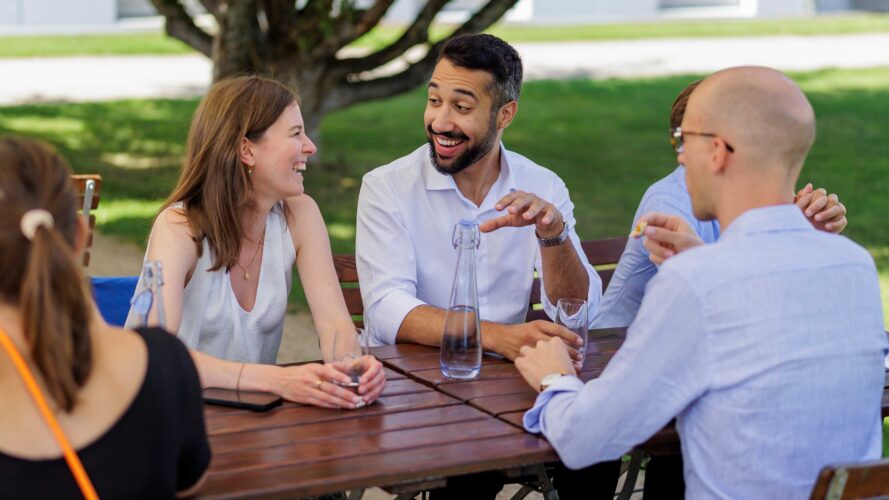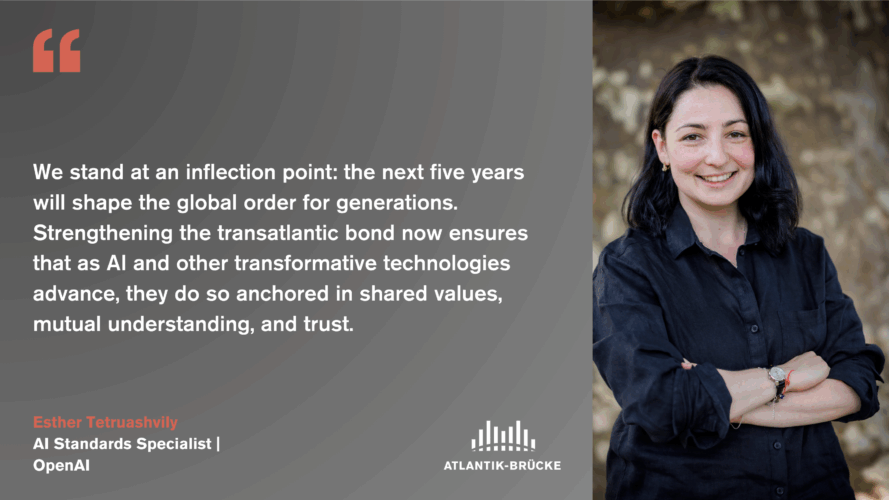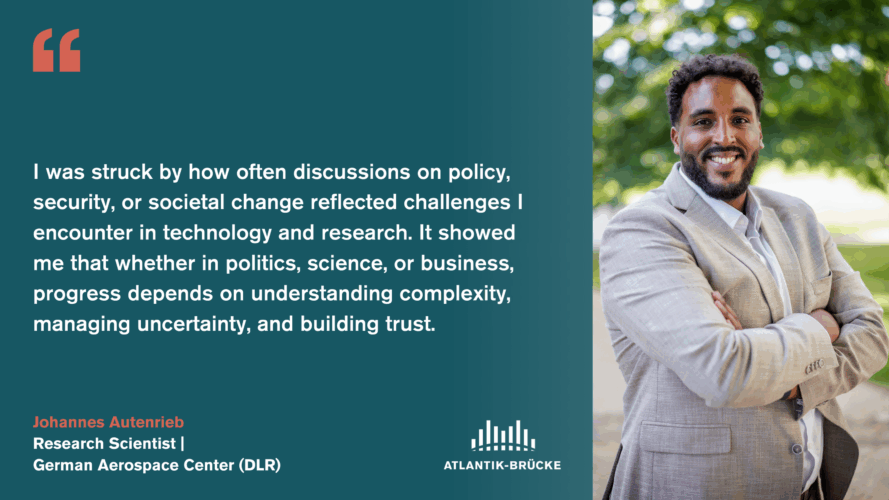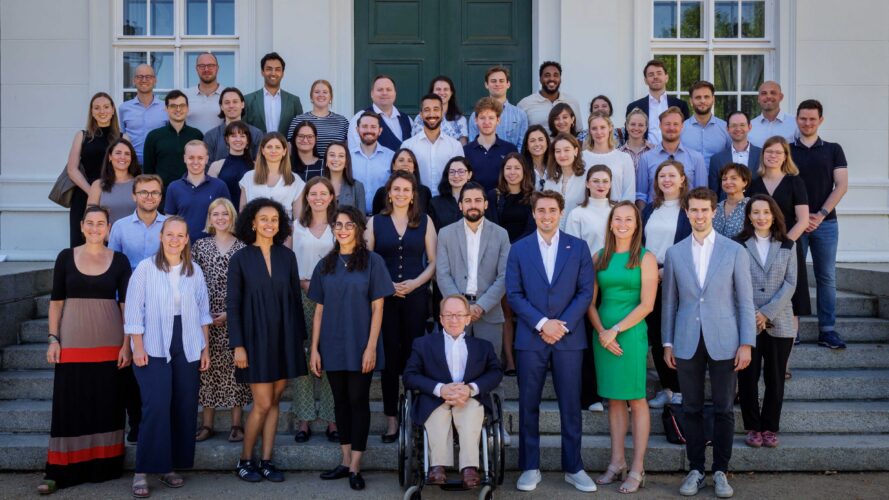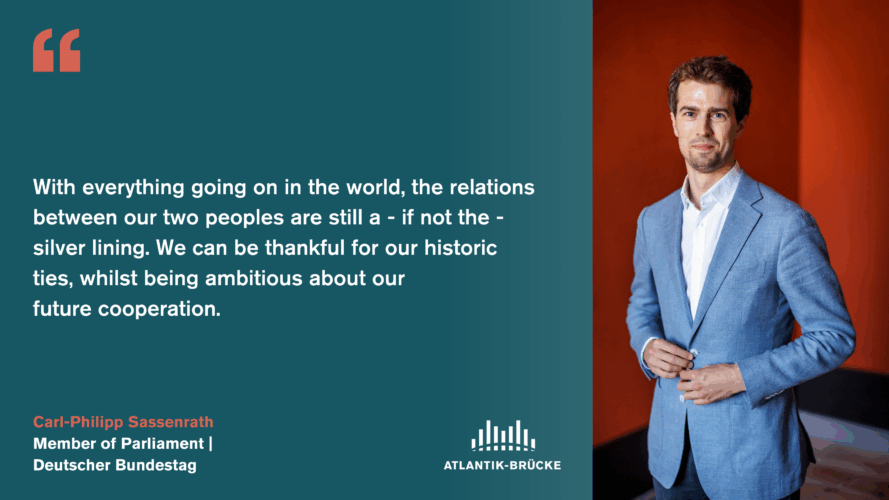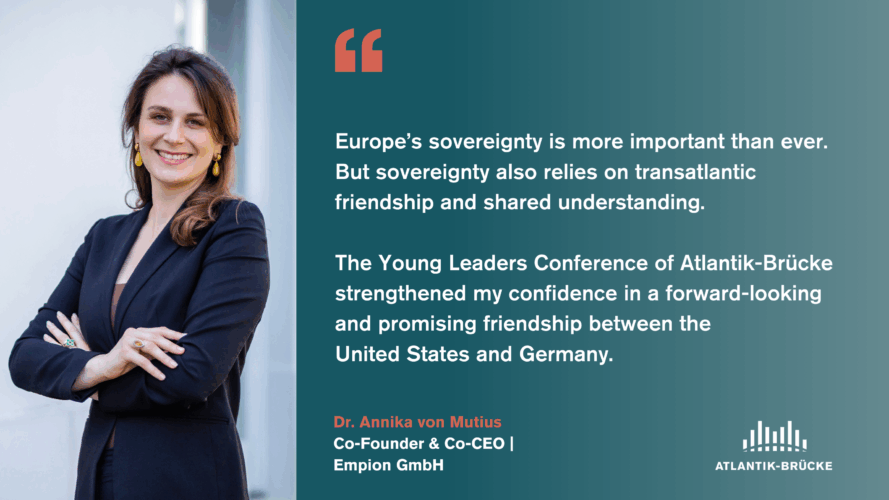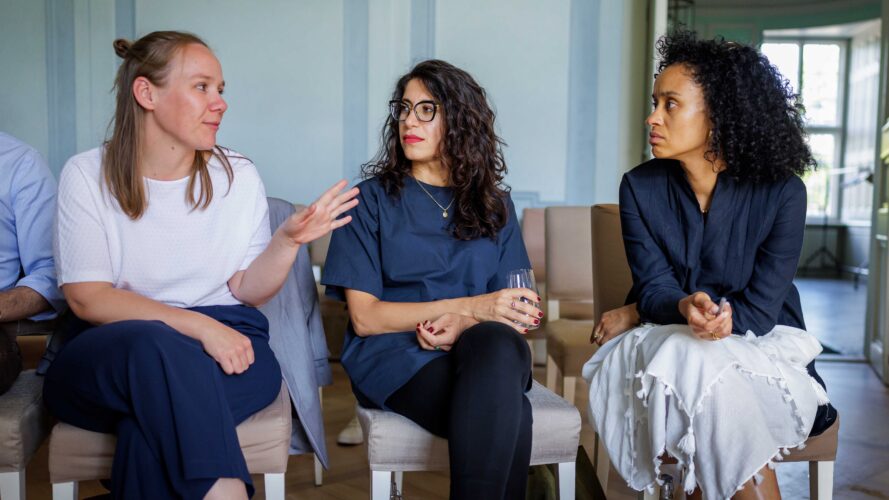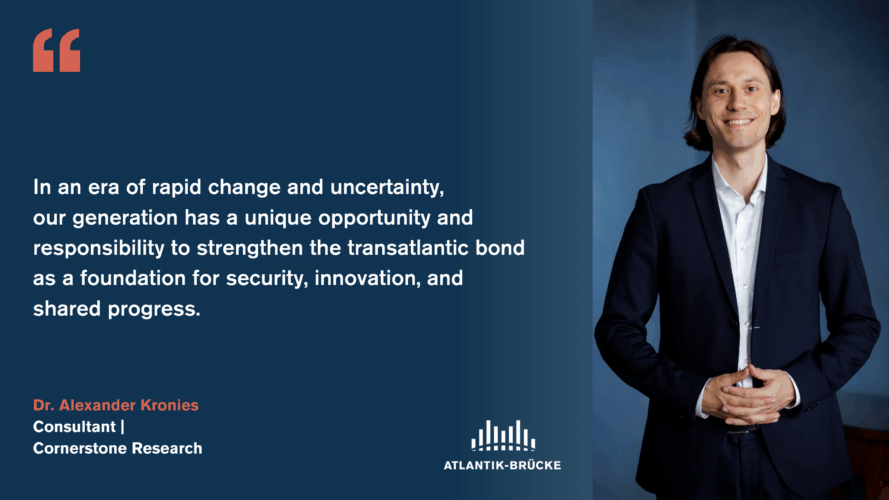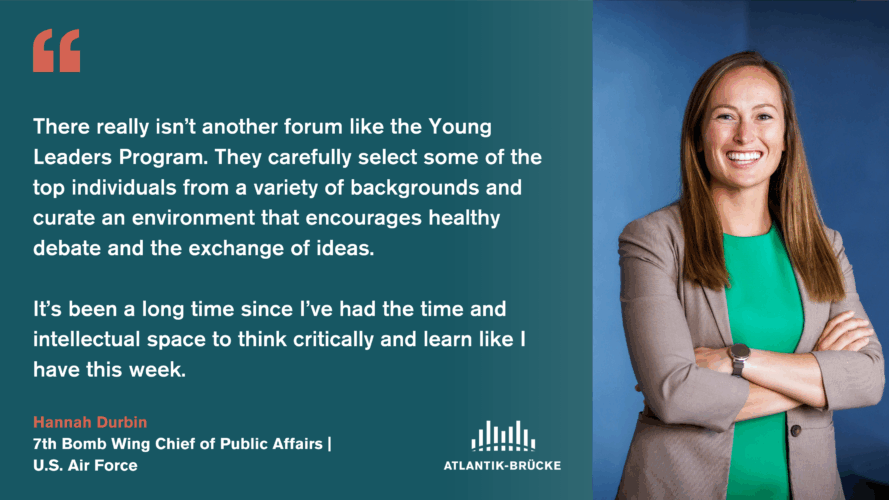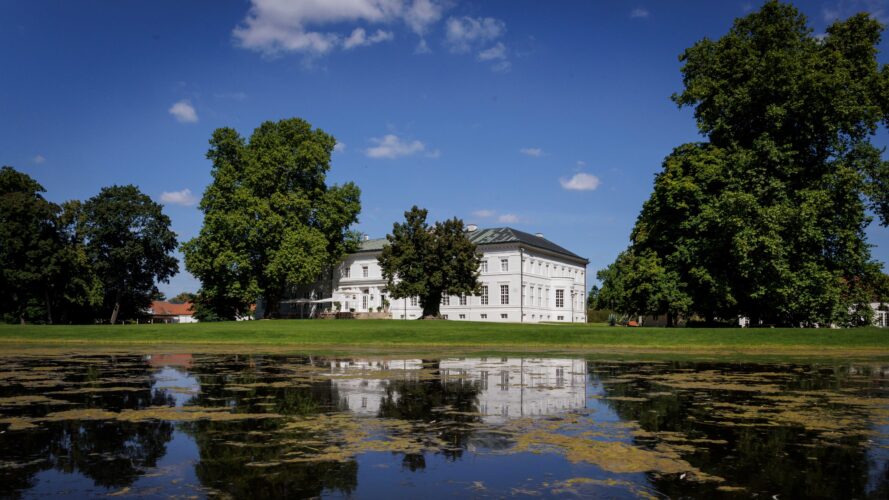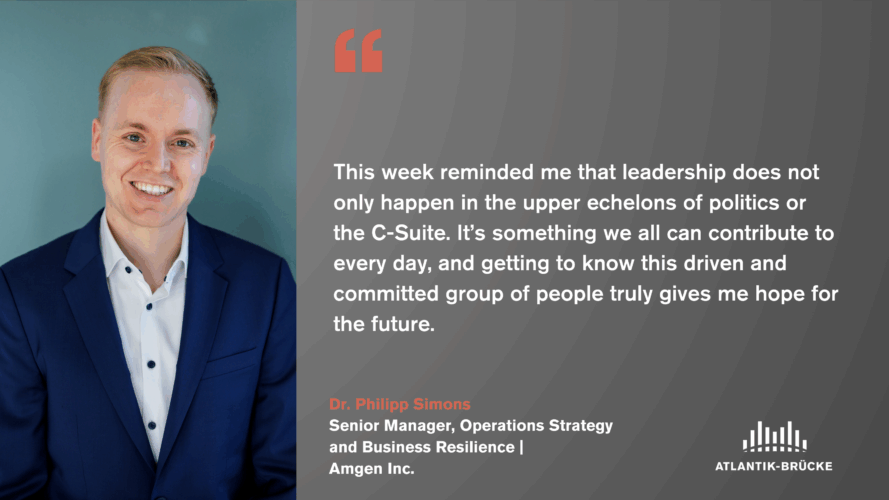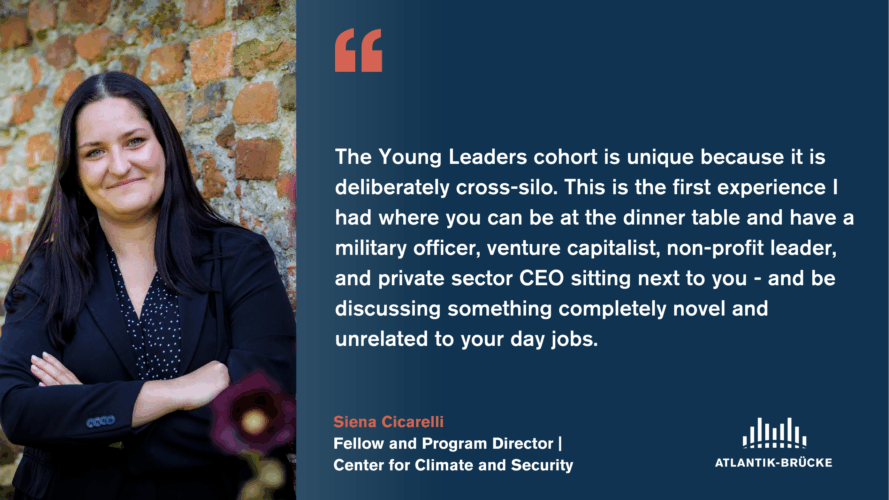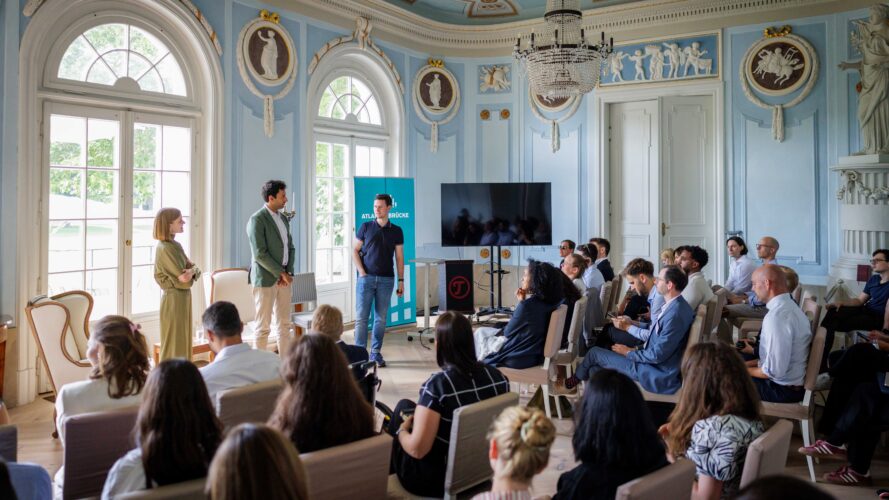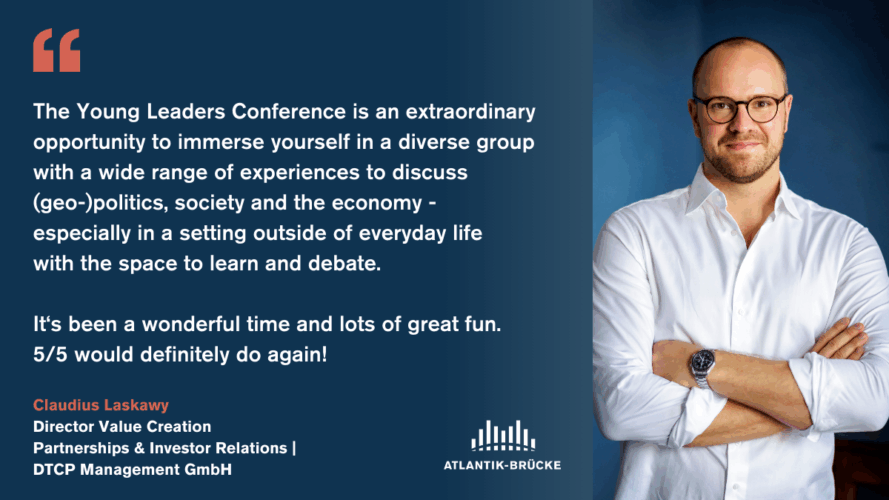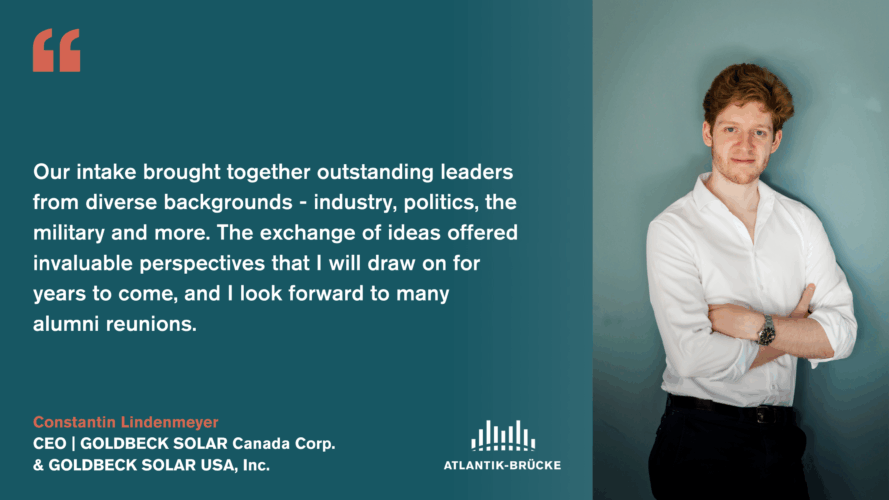“Bridging Leadership Across Borders”
The 46th German-American Young Leaders Conference of Atlantik-Brücke e.V. was held at Schloss Neuhardenberg in Brandenburg from August 9 to 15, bringing together 50 young leaders from across the United States and Germany. What promised to be an exceptional week of interaction, discussion, and connection to foster the transatlantic relationship proved to be a transformative experience for the 2025 cohort, both professionally and personally. This year’s cohort has explored some of the topics covered at this year’s conference in this report. Swipe through the photo gallery to see impressions of the conference and the cohort.
By Antonia Howaldt and Jason Drouyor
Setting the stage for collaboration
After a warm welcome by Julia Friedlander, CEO of the Atlantik-Brücke and her team Tobias Luthe, Head of the Young Leaders Program & Deputy Director of Programs, Louise Lüdke, Program Manager and Franka Ellman, Director of Programs and Transatlantic Partnerships, the conference opened with remarks from Prof. Dr. Michael Hüther, Director and Member of the Presidium of the German Economic Institute and Deputy Chairman of Atlantik-Brücke e.V. He addressed the evolving balance of hard and soft power, the strategic ambiguity of the Trump administration, the exhaustion of globalization, and the farewell to the post–Cold War international security and trade orders. He also spoke about the role of China, Germany’s Zeitenwende, and how debt brake reform enables increased defense investments, strengthening Germany and the EU as more independent allies. Prof. Hüther highlighted the tensions globalization has created, with both winners and those left behind fueling political polarization—as seen in the rise of AfD voters in Germany and Trump supporters in rural America.
Managing these tensions while preserving democratic self-determination remains, he emphasized, a central challenge of our time.
On the first full day, participants engaged in scenario sessions, envisioning best- and worst-case futures for Germany and the United States in 2030. With a realistic eye toward economics, politics, security, technology, society, and the environment, these sessions provided a valuable framework for understanding what is at stake in the years ahead and for identifying opportunities that could be seized through cooperation and innovation.
This year’s conference also brought back several Young Leaders alumni as guest speakers to engage with pressing questions of our time. Karsten Uhlmann (YL 2003), Managing Director of Frankfurter Brauhaus GmbH and Member of the Board of Atlantik-Brücke, gave a personal account of entrepreneurship and resilience in Eastern Germany in his talk “Beyond Berlin – Founding and Growing Businesses in East Germany.” He shared his story of growing up in communist East Berlin, experiencing the Fall of the Wall, purchasing the German brewery Frankfurter Brauhaus in 2003 with a friend, expanding it, later navigating the challenges of rising energy prices and eventually the global expansion including opening a German brewery in Charlotte, USA. The discussion also addressed the evolving political landscape in Eastern Germany, focusing on the lingering sense of marginalization and incomplete integration decades after reunification.
His reflections underscored how business, politics, and history remain closely intertwined in shaping the opportunities of today. Paula Cipierre (YL 2024), Global Head of Privacy at HCL Tech, shared insights on regulating artificial intelligence, balancing innovation with ethics, and the challenge of establishing global standards. A specific focus was given to delivering a comparative analysis of German/EU and U.S. AI governance approaches, highlighting Germany’s coordination through the EU AI Act and the U.S.’s executive-driven, principle-based strategy. Her analysis highlighted the continuing work that is needed in AI governance in the years ahead. Dr. Max Krahé (YL 2022), Co-Founder and Research Director, together with Dr. Florian Schuster-Johnson, Head of Growth and Budget Lab at Dezernat Zukunft, also visited to outline Germany’s economic and fiscal Zeitenwende, exploring both opportunities and trade-offs. Discussions across these sessions encouraged participants to critically assess how transatlantic cooperation can respond to shifting geopolitical and technological realities.
The program also offered opportunities to engage directly with experts shaping Germany’s political and security landscape. In a session on “Germany’s Army in Transition: Planning, Progress, and Pressure,” Colonel Karsten Struß, Head of the Strategic Management Division at the Bundeswehr, shared insights into the modernization of Germany’s armed forces, the pressures of adapting to new security realities, and the challenges of balancing planning with implementation. Complementing this, Claudia Kade, Head of the Politics Department at Die WELT, provided her commentary on the first 100 days of the new coalition and discussed the impact of algorithmic news consumption, as well as its role in shaping media reporting.
From policy debates to cultural immersion
Beyond the Schloss, participants traveled to Berlin for a series of immersive visits that blended policy dialogue with cultural exchange.
At the Edge East Side Tower, Antonia Bruhn, Senior Public Policy Manager DACH, Amazon Web Services (AWS), provided an overview on cloud computing in the age of (digital) sovereignty and its geopolitical implications. Clemens John, Public Policy Manager for Digital & Devices, delivered a briefing on broadband expansion through Project Kuiper, Amazon’s low-earth-orbit satellite broadband network, designed to provide fast and affordable broadband connectivity to underserved communities worldwide. Afra Gloria Müller, Corporate Affairs Manager, reported on Amazon’s current local community engagement programs in Berlin and DACH region, including KiezLab, offering free working space to the local Berlin community. These discussions at Amazon underscored how global enterprises can contribute locally while addressing international challenges in connectivity and data governance.
Siemtje Möller (YL 2018), Member of the Bundestag (SPD), Deputy Parliamentary Group Leader, and former Parliamentary State Secretary in the Federal Ministry of Defense under Chancellor Scholz 2021-2025, highlighted the challenges Germany faces in closing the gap between political ambition and defense preparedness, the difficult trade-offs required to strengthen capabilities, and the implications for transatlantic security cooperation. A Young Leader herself, she has also shared memories on the 2018 YL Conference, where she chaired a group session with Julia Friendlander on Western defense (or German defense). The following visit to the Bundestag provided both historical perspectives and contemporary insights about the Reichstag building, the structure of Germany’s coalition-based parliamentary system, and how the Bundestag is shaping Germany’s leadership role in Europe.
When visiting the Federal Chancellery, we deepened our understanding of the Chancellor’s pivotal role in guiding national policy and strengthening transatlantic cooperation. This visit included a discussion on the transatlantic relationship and European Policy with Jacob Schrot (YL 2022), Chief of Staff to the Chancellor, and Ole Funke, Group Lead at the Federal Chancellery. They provided their insights into Germany’s priorities within the EU and the importance of aligning European and transatlantic strategies.
Their remarks emphasized the need for strong coordination in addressing shared geopolitical challenges and underscored the role of the Chancellery in shaping Germany’s contribution to European leadership and transatlantic unity.
The cultural immersion culminated in a visit with Christian Awe, Artist and Painter, and a discussion on the Berlin art scene in his Berlin studio. His monumental painting Encounter, located in the heart of Berlin beside the Holocaust Memorial, offered a striking example of the exhaustive planning and vision required to realize such a large-scale project while preserving its balance of abstraction and photorealism. For participants, the artwork underscored how the intersection of art, history, and public space can serve as a catalyst for dialogue. In this context, cultural exchange was highlighted as a vital force in strengthening democratic resilience and deepening the bonds of transatlantic cooperation.
Collaborative outcomes
In seven different World Café sessions, participants engaged in small groups to discuss current transatlantic challenges, ranging from an Oxford debate-style to an informal “ask-me-anything” format. Topics included:
- Fakes, Hacks, and Influence – Cyber Threats and the Fight for Narrative Control
- From Growth to Geopolitics – How Venture Capital Is Being Redefined in a Fragmented World
- Decoupling or Interdependence – Competing with China in a Tech-Driven World
- Deterrence by Design – Building Credible Western Defense Capabilities for Modern Conflicts
- Rebuilding Trust – How to Lead within Integrity, Accountability, and Vision
- Beyond the Pitch – Operating, Scaling, and Thriving as a Young Company
- Power Shift – How to Lead the Global Energy Transition
The World Café sessions served as a springboard for sharing ideas that would later support the participants’ efforts in their respective working groups.
Throughout the week, working groups served as incubators for actionable ideas to strengthen and modernize the transatlantic partnership. Rather than treating defense, technology, trade, and regional alliances as isolated challenges, the groups approached them as interconnected pieces of a broader strategic framework. Participants left with insightful takeaways:
- AI Crossroads: Innovations, Ethics & Global Governance in a World of Strategic Rivalry – Participants discussed the regulation of cross-cutting AI risks, emphasizing the need for standardized safety norms and effective mechanisms to address ethical, security, and misuse concerns. The group considered various approaches, including leveraging existing international forums, establishing a new multi-stakeholder body similar to the IAEA model in the nuclear sector, or pursuing international agreements akin to the Paris Call in climate policy. The overarching goal was to advance AI governance in a way that promotes both international collaboration and innovation.
- Hard Power, New Realities: NATO, Ukraine, and the Future of Collective Western Defense – Participants worked to craft innovative policy recommendations to strengthen transatlantic security, including proposals for a greater transatlantic alignment on addressing security challenges posed by China, an increased leadership role for Europe when working towards a sustainable peace in Ukraine, and innovative financing mechanisms to support European rearmament.
- The New Politics of Trade: Supply Chains, Sovereignty & Global Power Shifts – The working group identified challenges in international trade and economics, focusing on how transatlantic partners could expand their cooperation to address them. Key topics included security risks, externalities related to the rise of non-market economies and practices, as well as the domestic socio-economic impact of trade policy. Participants concluded that further escalation of trade barriers seemed the most likely scenario in the near term. Still, they highlighted the need for deliberate and strategic efforts to ensure free and open trade principles remain a leading objective in the newly evolving trade environment.
- A Strategic Partnership? Evolving the Transatlantic Bond Beyond Nostalgia – The group focused on opportunities to modernize the historic transatlantic alliance to one that appeals to both the historic shared values and today’s transactional interests. The group proposed Germany and the United States establish a bilateral vocational apprenticeship program, a commercial shipbuilding repair and recycling scheme, and an energy resiliency initiative for German investment to support U.S. energy diversification.
By outlining concrete initiatives—complete with implementation strategies, resource planning, and stakeholder engagement—the working groups demonstrated how coordinated action can amplify collective strength, enhance adaptability, and promote leadership across borders.
A very special fireside collaborative session was hosted towards the end of the program to discuss leadership qualities and what it meant to be a leader. Four young leaders of the group shared their personal reflections and experiences with leadership. Having met and seen so many Atlantik Brücke Young Leaders alumni in leadership positions, this discussion took on a whole new meaning as the 2025 program came to a close.
A lasting impact
The conference concluded with reflections on key takeaways and a farewell dinner at Neuhardenberg Airport. The week reinforced the value of embracing diverse perspectives, challenging assumptions, and translating dialogue into actionable initiatives. Participants departed with strengthened transatlantic bonds, renewed commitment to shared democratic values, a new network and friendships, and the belief that leadership is defined not just by the ability to navigate change—but to lead it.

